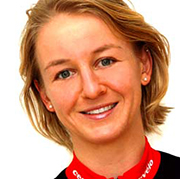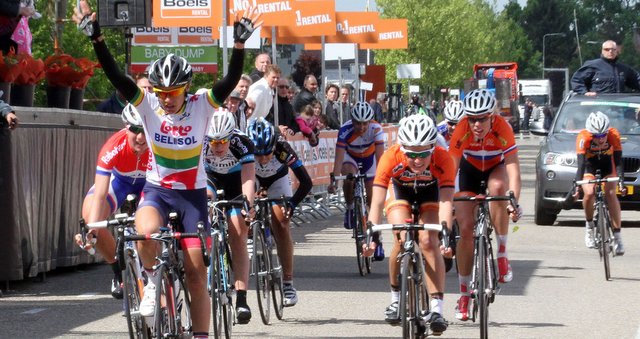Sarah Connolly reports on another controversial week of racing for the women’s pro-peloton.
It’s no secret that it’s much harder for professional female cyclists to have a financially secure racing life than men. From the get go, they know it will be a labour of love, chasing their dreams to be the best in the world. They don’t take home huge salaries or have the complex support systems in place that the men do, they depend on their passion for the sport to keep them going.
Then, weeks like this come along, testing the resolve of even the most dedicated of female cyclists. It started with the Tour of Chongming Island, World Cup race, where human error resulted in the peloton being misdirected at the end of the race, leading to Tetyana Riabchenko winning a solo breakaway.
Undeniably frustrating, the peloton graciously accepted the error, “that’s bike racing” after all, and moved on to their next races. This is where things took a turn for the worse.
The Tour de Languedoc Roussillon
As it stands, the Giro Rosa is the only one race in the women’s pro calendar that the UCI, cycling’s governing body, allows to be longer than a week. This has not always been the case, the Grand Boucle, last ran in 2009 and the Tour de l’Aude which Emma Pooley won in 2010, also it’s final year to run.
The Tour de l’Aude was a beautiful race, taking in the French Pyrenees over some of its stages. It’s been greatly missed, so when race organisers announced the Tour de Languedoc Roussillon, billed as an event that would grow into a Grand Tour, the cyclists and fans were understandably excited.
Not without its teething problems, the Tour de Languedoc Roussillon was cancelled last year, with just two weeks notice due to financial issues. This didn’t stop organisers from trying again and after repeated assurances from them, teams gave it another chance and signed up.
Fast forward to last Thursday, the day before the 2013 edition of the Tour was set to start. Teams were already in France, reconnoitering the route, the rest were en route, so the news that the race was cancelled came as quite a shock to say the least.
Race organisers hadn’t paid the required deposits to local police to cover the event. With no police to ensure the safety of the riders and public, to marshal the event and organise the rolling road closures, the race just couldn’t go ahead.
In the hours that followed, things descended into chaos, teams were left rather confused as to where they stood. After a few more hours, the organisers stepped up and said that all teams should travel to the race, because it may actually start on Friday, or possibly Saturday!
The race didn’t start on Friday as expected; in fact the organisers were still looking for sponsors. Finally, in the afternoon, an announcement was made that a shortened race would start on Saturday. For some, this was too little too late, with two of the biggest teams on the start list, Rabobank-Liv/giant and Boels-Dolmans, leaving in protest, not just for whether the race would go ahead but for the treatment of the teams. Many cyclists were appalled at the accommodation and food laid on by the organisers, with Annemiek van Vleuten and Iris Slappendel tweeting photographs of the meals they were expected to race on.
Other teams decided to stay, however it wasn’t plain sailing for the organisers. The cyclists showed their disappointment with a sit-down protest at the start of the first stage.
It was the decision of each team as to whether they would start the race, but I can’t help but feel that it’s ridiculous that they even have to make these choices. The UCI rank this Tour as 2.2, who, despite being approached by all sorts of media, still haven’t made a statement. It looks as though races will continue to be cancelled, even more so in these difficult economic times, but at the very least, organisers shouldn’t be allowed to leave it just 24 hours pre-race before they announce cancellations.
There were many signs this race was in trouble, from last year’s cancellation to the fact there’s still no official website for it. Teams and riders are being put in a difficult position, because if the race organiser and the UCI say something is happening, they have to trust it, but let’s be honest this is not the best way to get a women’s Grand Tour back on the calendar.
When the race did go ahead, on the Saturday, Marta Bastianelli (Faren – Lets Go Finland) won the first stage in a bunch sprint. Stage two was tough, with 2800 metres of climbing through the Pyrenees, snow falling as they crossed the finish line. Emma Pooley (Bigla) may be concentrating on finishing her PhD this year, but she proved she’s not lost her climbing legs, winning the stage solo, taking the race lead, ahead of Fabiana Luperini (Faren) and Ashleigh Moolman (Lotto Belisol).
Hopefully the initial chaos of the race is behind us and the remaining three stages suffer no problems.
Tour of California Invitational Time Trial
Cycling difficulties weren’t reserved for Europe this week. In the USA, the men have been racing the prestigious Amgen Tour of California. In previous years the race had a women’s crit running alongside the men’s race, this year, all that was on offer to the women was an “invitational time trial”.
This runs on the same 31.6km course as the men’s race, and it’s always interesting for how different women’s and men’s speeds really are, or it would be, except only a handful of women were invited to race. This year it was only fifteen women, including a triathlete and a cyclocross rider, all but two from the USA, and not representing all the top teams. Apparently the decision not to run this as a proper race is financial, but it’s difficult to comprehend, given that not only is the Tour of California the biggest race in the USA, the North American races are renowned for how good they are for cyclists of all disciplines.
Races like the Redlands Classic, Sea Otter Classic and Tour of the Gila show how they can run women’s and men’s stage races alongside each other, providing great experiences for cyclists and spectators – and USA races show Europe how it should be done, providing equal, serious prize money for all.
However, all that aside, fans chose to view the positives, that this race was happening, and was being streamed live on the Tour Tracker. Because the riders were set off at 30 second intervals, it soon became very exciting, with Alison Powers (NOW and Novartis for MS) catching race favourite Evelyn Stevens (Specialized-lululemon), and battling for the lead….and then the coverage stopped! You can see from the video, for some reason the cameras stopped after just three riders had finished and went to a blank screen for a while, before the men started. It was a strange decision, choosing to show the worst men over the best women – and asking both the Tour Tracker and the Tour of California hasn’t had results in finding out why.
Out of the road, Stevens had fought with Powers until they got to the hard climb at the end, when Stevens’ climbing skills really came into force, enabling her to ride away, winning by 56 seconds, with Kristin McGrath (Exergy TWENTY16) in third place. The big loser of the race was poor Amber Neben. The former World ITT Champion crashed on a descent, breaking her hip and ribs – and our thoughts are with her for a full recovery.
Tour of Zhoushan Island
It wasn’t all bad news this week. Wiggle Honda, Hitec Products UCK and RusVelo decided to stay on in China after the World Cup, to race the hilly Tour of Zhoushan Island, alongside riders from all over Asia. Wiggle’s Giorgia Bronzini, who’s having a great run of form, won the first stage from a two-woman breakaway with Hitec’s Elisa Longo Borghini. Although Longo Borghini’s Norwegian teammate Cecilie Gotaas Johnsen won stages 2 and 3, from a bunch sprint and a five-woman breakaway, Bronzini’s clever riding meant she won the general classification – taking her first ever overall stage race victory.
Grand Prix Gatineau
In Canada, the peloton were in Quebec for another one of these fantastic festivals of cycling that celebrate everything we love about the sport, the Grand Prix Gatineau. These happen the world over – weekends and weeks of racing, with elite races alongside mass participation rides for cyclists at all levels, giving cycling fans the chance to immerse themselves in the sport. Gatineau has races for adult, junior and masters’ men, mass participation rides at different levels, and an open ride where parents could bring their children to ride alongside the pro women. For the elite women, there was a day race on Saturday, and today there’s set to be a time trial, both ranked at UCI 1.1 level.
The day race was 12 laps of a hilly course, and became a battle between the escape artists and the sprinters. Steph Roorda (GSD Gestion-Kallisto) attacked and was joined by Lex Albrecht and Véronique Fortin (Team Canada), the three worked together to escape – but behind them, two teams Tibco and Optum were pushing hard for a bunch finish. The breakaway trio were caught at the start of the final lap. Team Tibco had everything under control, and their queen sprinter, Shelley Olds, showed why she’s one of the best in the world, winning ahead of Optum’s Joëlle Numainville, with GSD Gestion’s Katarzyna Pawlowska in third.
What’s next for women’s cycling?
May is always a quiet month for women’s racing, specially since the Tour de l’Aude ended in 2011. Perhaps it’s a good point to reflect at what’s happened and see what it means for the sport. On the one hand, we’re in really interesting times, with the Olympic Games and World Championships last year showing the world that this is an exciting sport that people love to watch when they have the chance.
You just have to look on Twitter, Facebook, and websites like this to see how much people love the sport and are eager for any information – even on the roads, we see more and more women getting involved in racing. But for some reason, the organisations in charge of promoting and developing women’s cycling aren’t paying attention, and, if their responses to this week’s problems are anything to go by don’t seem to care.
Last weekend also saw the first round of the MTB cross-country World Cup. Watching coverage of the races, it is clear that not all racing is as unequal as road racing is. Red Bull helped stream it live online, with enthusiastic and knowledgeable commentators involved, covering incredibly well organised races, where the women are treated as the superstars they are.
If you follow MTB, BMX or track racing, you will see men and women competing at the same events, equally embraced and loved by the crowds. It leaves me wondering why it is that road; the biggest cycling discipline of all is so far behind?
Something needs to change, and it’s up to the national and international federations to demonstrate that they are actively working to follow their mission statements and develop and promote cycling for everyone, regardless of gender.



